Now that businesses are being allowed to reopen, they need to make sure they are doing everything possible to attract customers back as soon as possible. In the coronavirus era, that includes a new criterion, “Is it safe to visit? “
The vast majority of Americans are very fearful of venturing out into public places. Here’s the level of fear just reported from a June 12-14 poll by Harris.
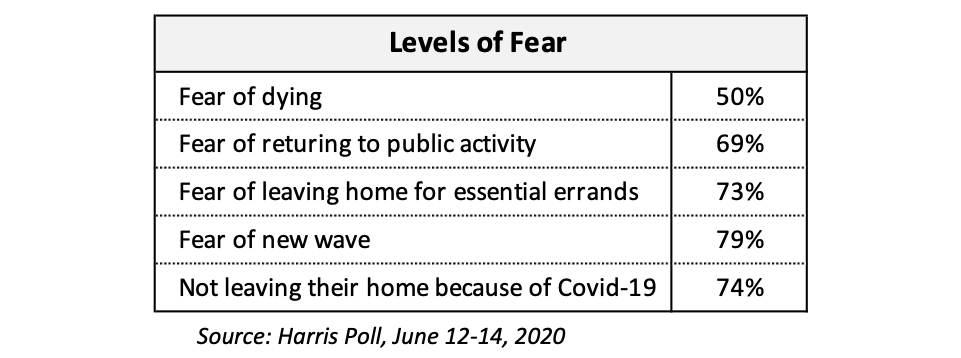
Morning Consult reports from their June 12-14 poll that only slightly more than one-quarter (29%) of Americans are currently socializing in public places, with two-thirds of those saying they are now socializing less than previously.
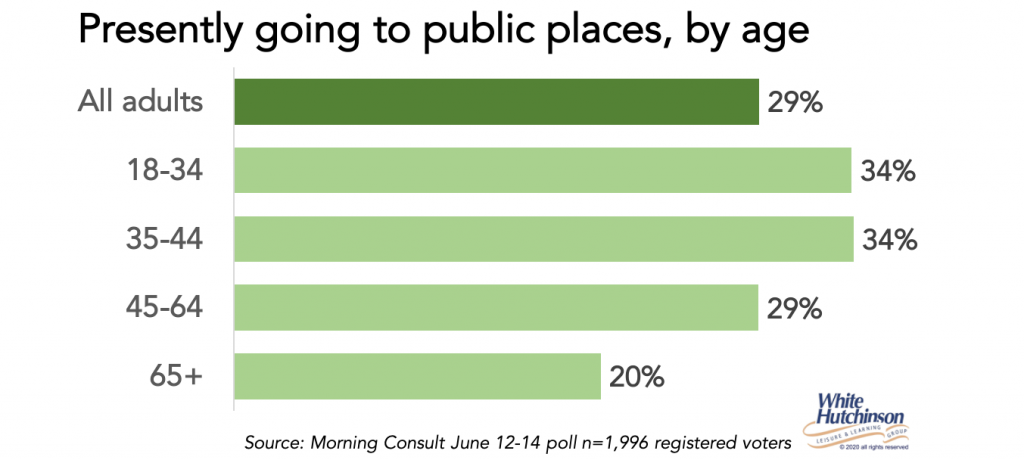
The most recent NORC Covid Impact Survey taken May 30-June 8 found that three-quarters of people are avoiding public or crowded places and 72% are avoiding restaurants.
As I reported in my most recent blog, a June 12-15 Axios/Ipsos poll shows a recent declining willingness of people to visit public places. The poll found Americans have a growing concern about the Covid-19 pandemic. 54% are extremely or very concerned about the outbreak, up from 48% the previous week. 64% view returning to their pre-Covid life as risky right now, up from 57% the previous week.
This all indicates that fear of catching coronavirus is in the forefront of peoples’ thinking when they are deciding whether to visit a particular reopening business. There’s currently a very strong fear of going out (FOGO). How safe a business will be is now a major consideration for whether most people will visit.
The U.S. response has been rather scattered and less successful in stopping the spread of coronavirus in many areas. Most people are hearing mixed and muffled messages about what to do to protect themselves and stop the spread. It’s not surprising that a lot of people are believing misinformation as a result and others are just throwing up their hands and either self-quarantining or acting as if there is no danger.
The front page of yesterday’s Wall Street Journal reported there is growing consensus about how exactly you catch the coronavirus. It reported that scientists say it’s not common to catch Covid-19 from a contaminated surface nor is it from fleeting encounters with people outdoors. Instead, the major cause is close-up, person-to-person interaction for extended periods, especially crowded events, indoor poorly ventilated areas and at places where people are talking loudly or singing. The Journal says what matters is “Enough virus has to make itself over to you or build up around you over time to trigger an infection. Unprotected contact with someone less than 6 feet away poses a high risk.”
Infectious disease studies have identified respiratory-droplet transmission as the major mode of Covid-19 transmission. When we breathe, speak, sing, yell, cough or sneeze, tiny respiratory droplets are projected forward from our mouths. When speaking, the large droplets hit the ground within 3 feet, the smaller ones within about 6 feet, while the smallest of all can travel greater distances. Singing, talking loudly, yelling, coughing and sneezing projects the droplets much further. When you are within the range of the projected droplets, the droplets can transfer virus to you if they land on your eyes, nose or mouth or you inhale them.
The number one way to prevent the spread of coronavirus that we know of is to mask. Although a mask offers some protection for the mask wearer from inhaling virus droplets from someone else, they are not that effective compared to a medical N95 mask that is properly worn. Masks are most helpful in stopping respiratory droplets that might spread the virus from getting into the air from an infected person. In other words, what masks do is prevent an infected person from transmitting droplets that then infect someone else.
The problem is that a large number of people are infected with the coronavirus and don’t know it. They are either presymptomatic, infected without symptoms but later develop them, or asymptomatic, infected and never develop symptoms.
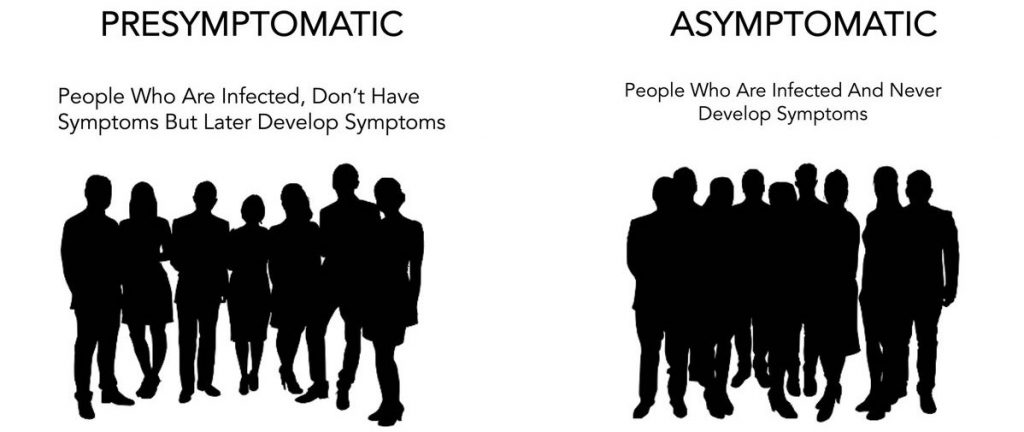
A study published June 3rd in the Annals of Internal Medicine reported the researchers found that a minimum of 30%, and more likely 40% to 45% of people have the virus without knowing it due to lack of symptoms, the silent spreaders, some of whom are super spreaders.
A recent study in Germany found that face masks reduce the daily growth rate of reported infections by around 40%. Another study in the Proceedings of the National Academy of Sciences, concluded that “wearing of face masks in public corresponds to the most effective means to prevent interhuman transmission.”
In one Missouri salon, no customers became infected with the virus despite two hairstylists being sick. Scientists believe it was because they were wearing face masks. Many countries with virtually universal mask wearing in public have kept coronavirus transmission under control, including Japan, Hong Kong and Taiwan.
What all the studies support is that we all need to wear masks in public places because we don’t know who is an asymptomatic carrier. Face mask use is a social contract. My mask protects you; your mask protects me.
Unfortunately, government jurisdictions in the U.S. as well as from the Federal government, have not been giving people good information about the importance of mask wearing, as it is often classified as an optional or encouraged safety measure, not mandatory.
Despite this, three-quarters of U.S. adults (76%) report that masks are “very” or “somewhat” effective at preventing the spread of coronavirus according to a Morning Consult June 1st poll. And even though mask wearing is not required in much of the country, the majority of Americans are currently wearing masks in public places. Engine Insights reports that nearly two-thirds of U.S. consumers (62%) wear a face mask without fail/usually wear one.
Here’s the results from the May 28-June 2 NBC/Wall Street Journal poll that found that nearly two-thirds of people wear masks all the time and another fifth sometimes.

According to the June 1-8 NORC Covid Impact Survey, 90% of Americans say they’re wearing a mask. That’s higher than the 78% that said they were wearing a mask in April.
The following chart shows the survey results from the Axios/Ipsos June 12-15 poll.
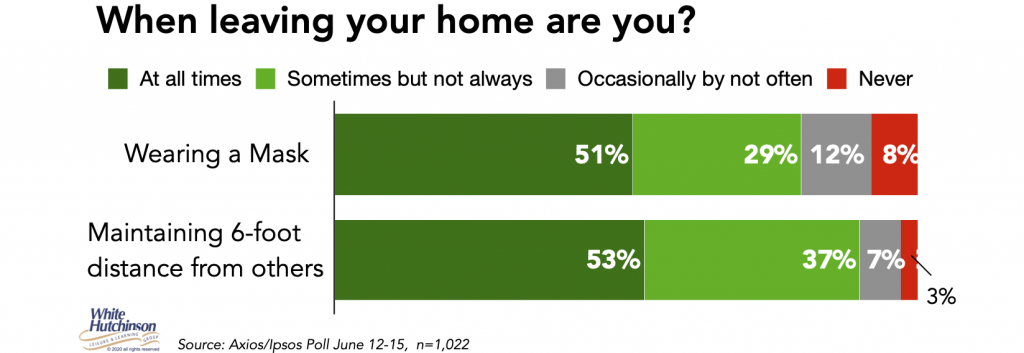
A Globalwebindex survey May 19-20 found that 47% of U.S. consumers say that mandatory facemasks are an important factor to reopening public spaces.
Ipsos’ Consumer Health & Safety Index that evaluates how retailers are operating amid the Covid-19 pandemic found almost two-thirds of shoppers (62%) would stop shopping at a retailer that is not taking health and safety seriously. The study found the certain practices were more critical than others. Those included face coverings, managing the number of customers in the stores and 6-foot social distancing. “The ability to deliver on health and safety efforts is now the most important aspect of the customer experience, and it will be for some time,” said Nick Mercurio at Ipsos.
The difficulty I see with many reopening businesses being able to recover sales as fast as possible is that they are not requiring customers, as well as staff, to always wear masks (except when eating or drinking). This is especially true for businesses where customers spend a lot of time, including location-based entertainment (LBE) venues where people will spend 1.5 to 2.5 hours, with most being indoors, and dine-in casual and formal restaurants where people spend around an hour, mostly indoors.
When people who are worried about catching coronavirus (the majority of people) and who understand the importance of mask wearing to prevent catching it, learn or visit an LBE or restaurant where not everyone is wearing a mask, they will likely leave or not come. A recent Morning Consult poll found that almost three-quarters of people who wear masks (72%) are the most uncomfortable socializing in public places, far more so than the 30% of non-mask wearers who are uncomfortable.
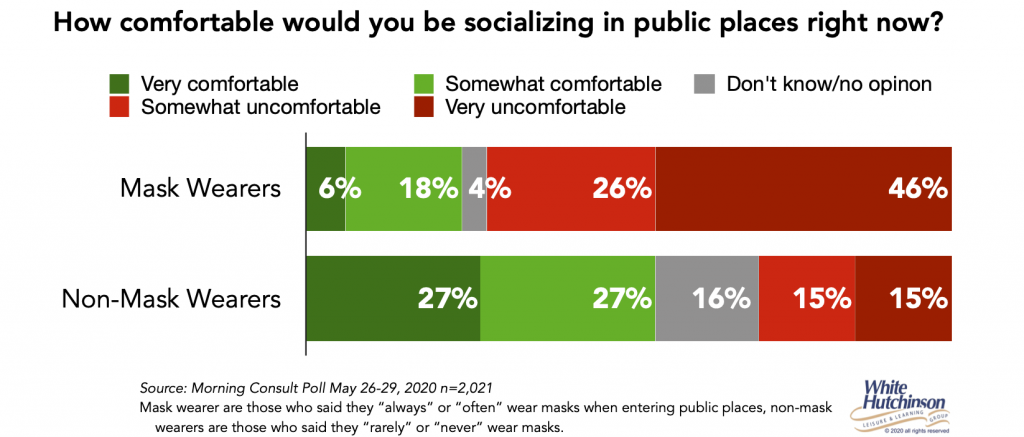
The poll found that non-mask wearers’ high comfort levels are directly translating to their behaviors, as 45% of them say they are currently continuing to socialize in public places, three times the share of mask wearers (15%). I believe this indicates that the majority of the public who wear masks are not only the most fearful, but also understand the importance of masks to stop the spread, both to themselves and to others.
I believe a key consideration of growing business is quite simple. As my last blog documented, three-quarters of all adults and two-thirds of 18-34 year-olds are currently uncomfortable visiting any type LBE. So, to gain back customers, LBEs need their safety to be as positive as possible. If mandatory mask wearing by both staff and customers is not required and enforced, they will probably not get many mask wearers, the majority of potential customers, as seeing the non-mask wearers will keep them away. The share of mask wearers you will gain with a mandatory policy will far exceed the few non-mask wearers who will refuse to come on some principal.
The other important reason to require customers to wear masks is to protect staff from catching Covid-19 from presymptomatic and asymptomatic customers. A new analysis from the Kaiser Family Foundation Almost found that one in four U.S. workers is at high risk for serious complications from COVID-19 if infected with the novel coronavirus.
Disney, Universal and other LBE operators understand these dynamics. That’s why they are making mask wearing mandatory for everyone in their venues.
The bottom line is that the number one way that we know of to prevent the spread of coronavirus in public places is to mask followed by social distancing. The combination of the two is most effective. And if you aren’t requiring these practices, there’s a huge swath of people that will just not come, plus you will endanger your workers and not help control the coronavirus from spreading.
Additional reading:
Great blog on what’s the deal with masks and the transmission of Covid-19 by Erin Bromage, Assoc. Prof. of Biology at the University of Massachusetts, Dartmouth. Click here to read.
Wall Street Journal article “How exactly do you catch Covid-19? There is a growing consensus.”




